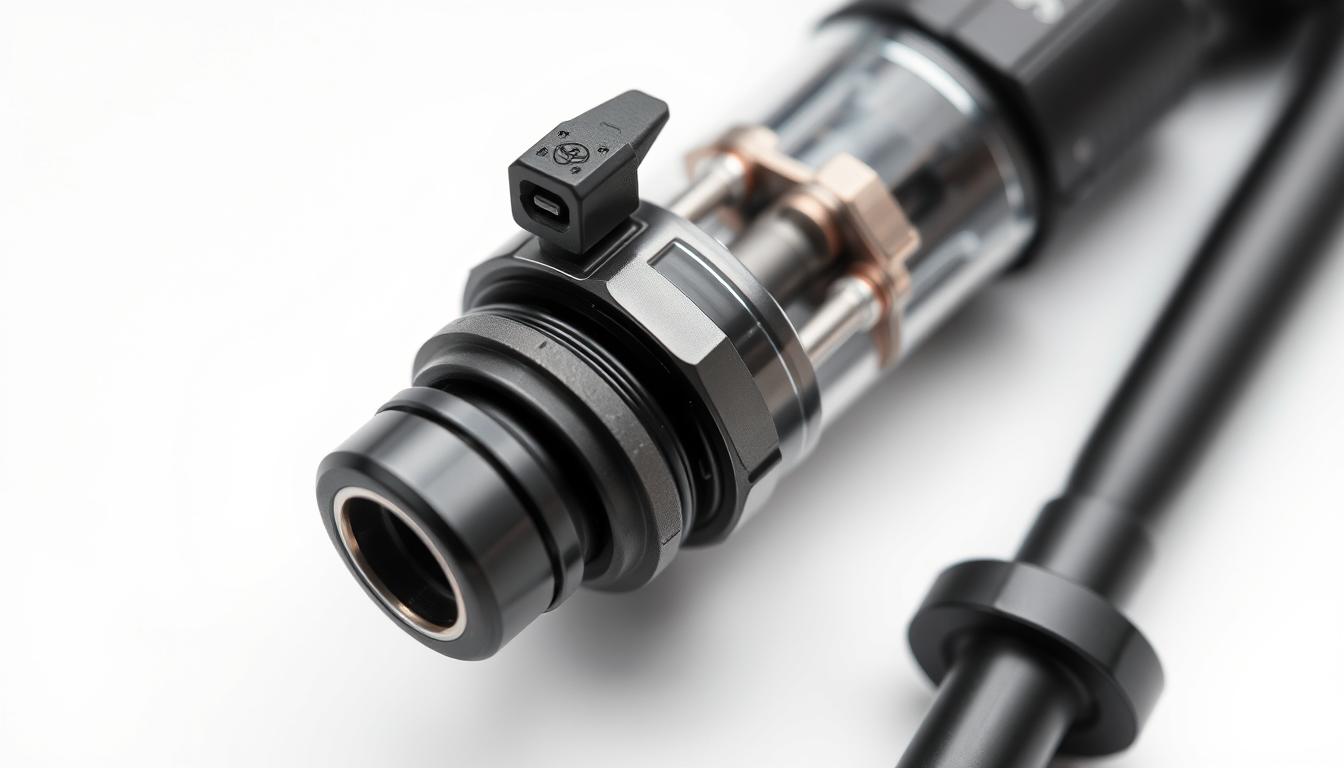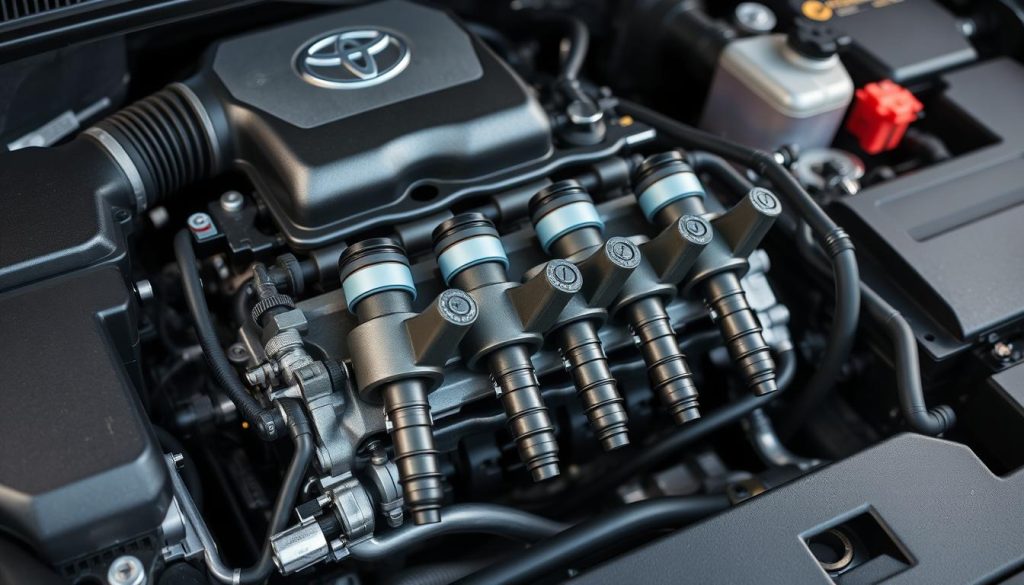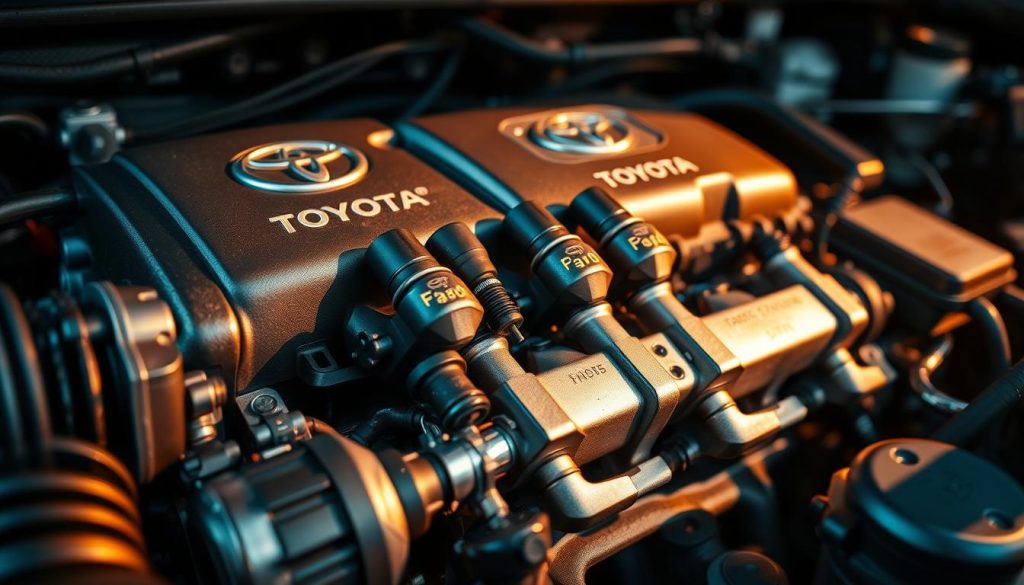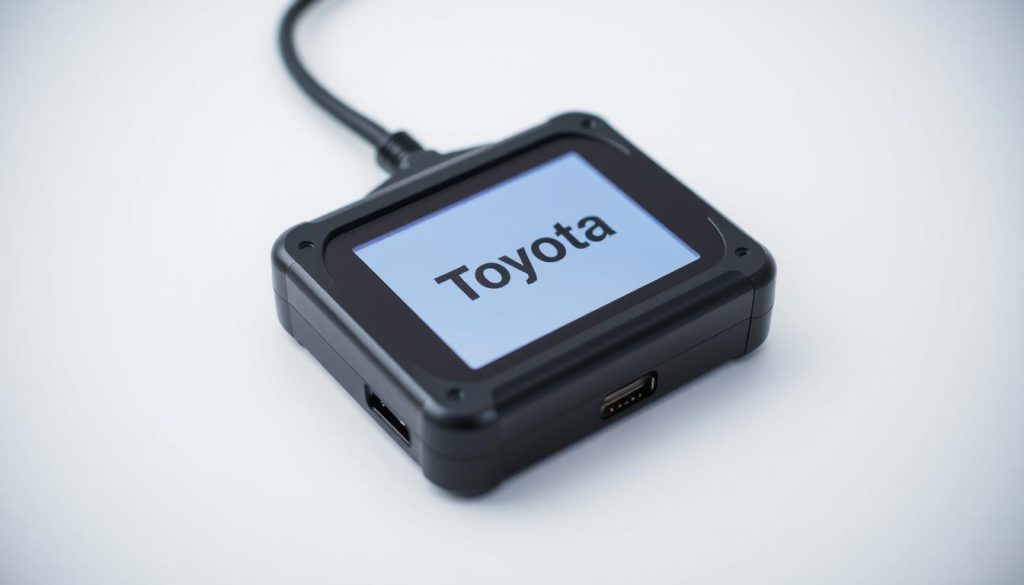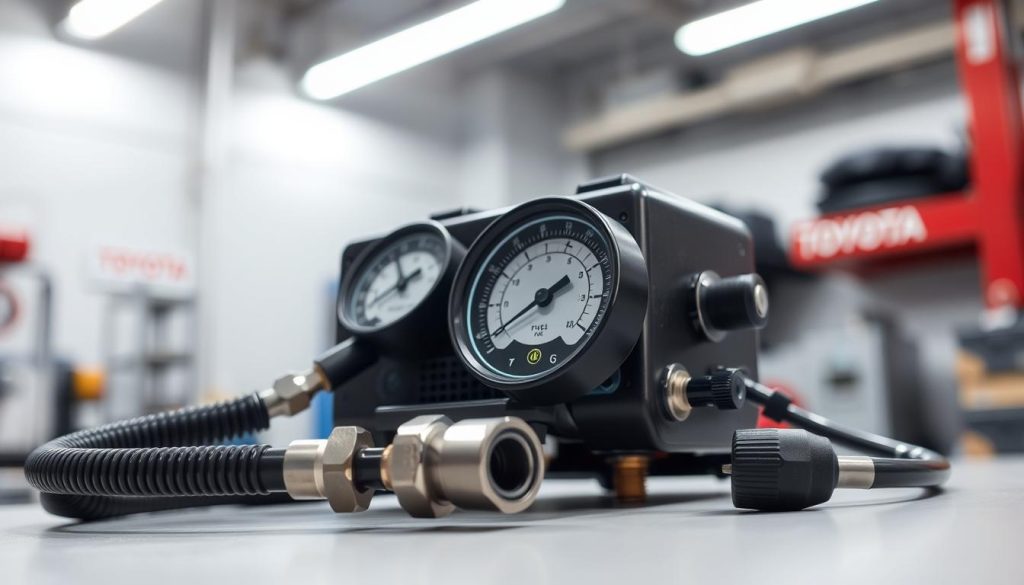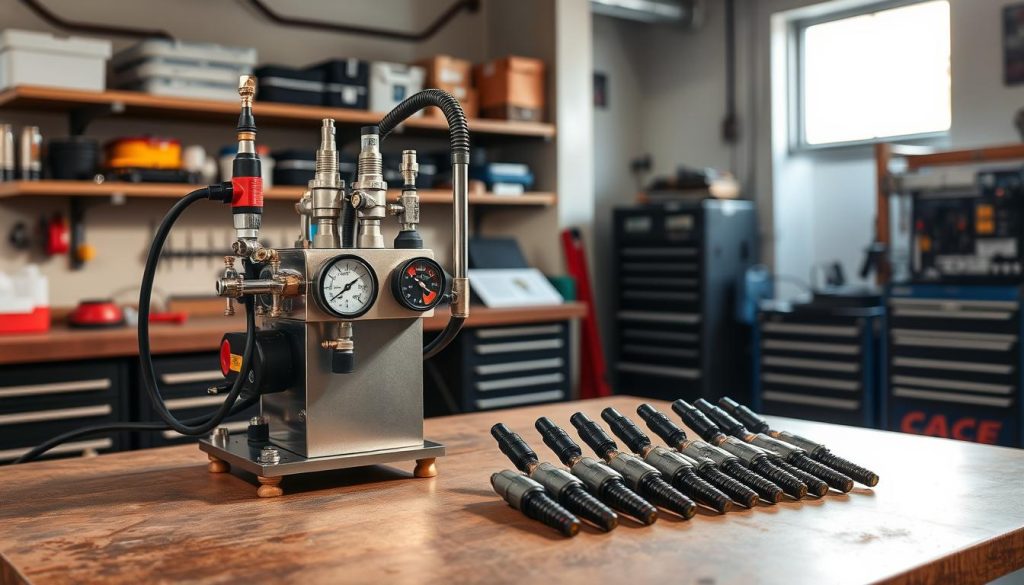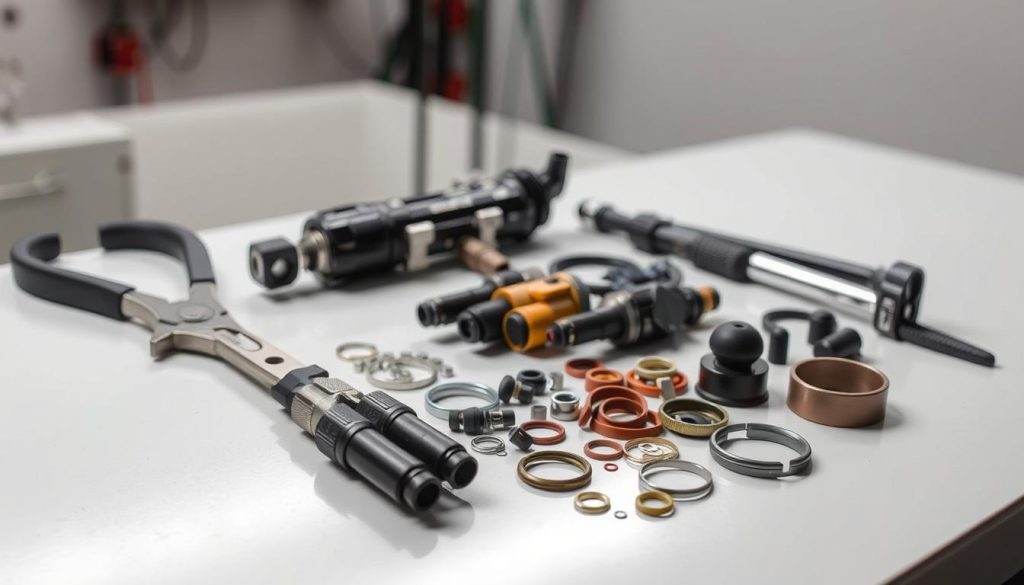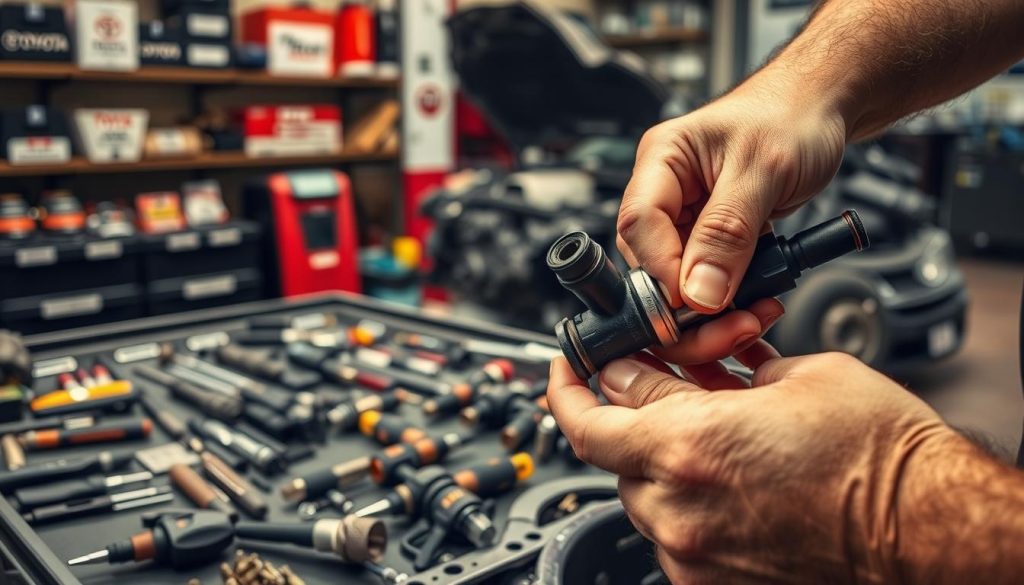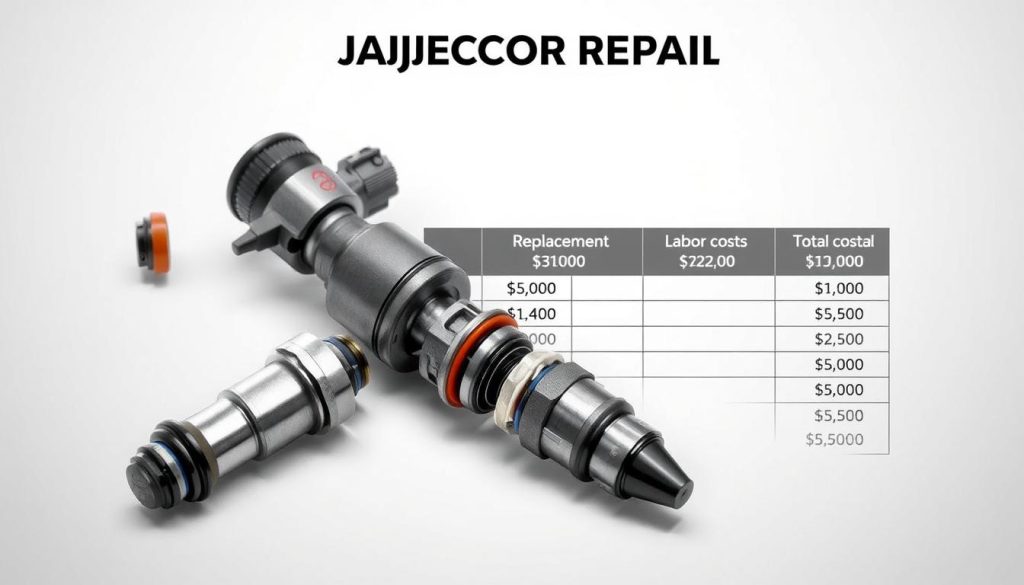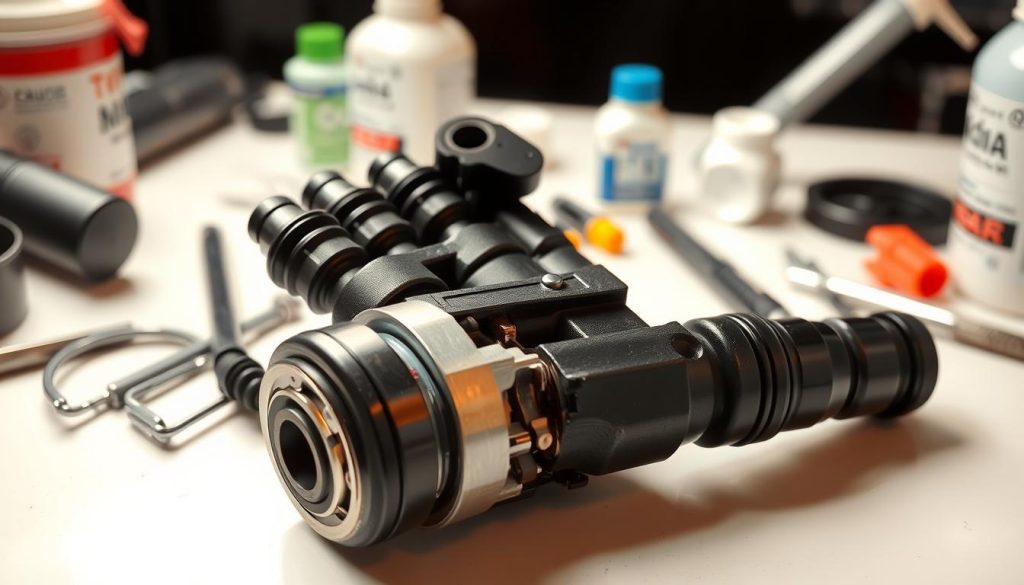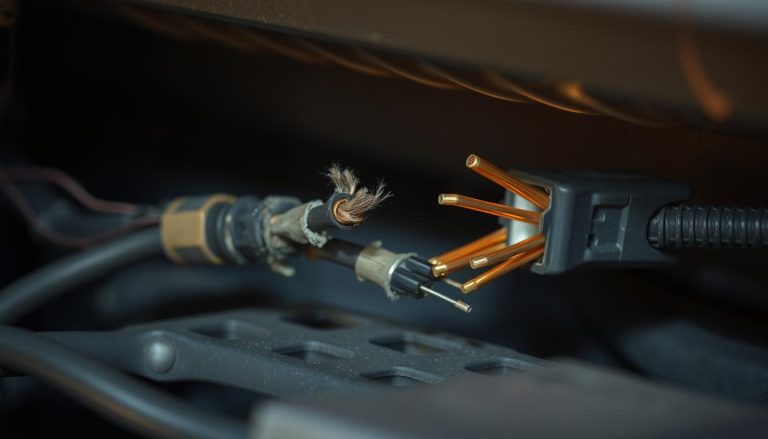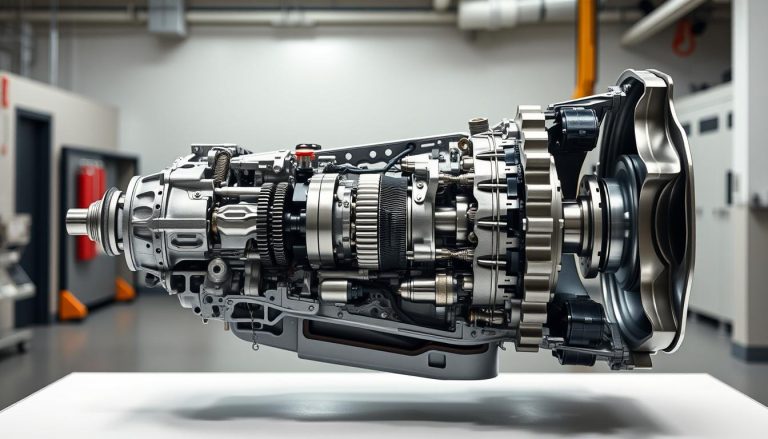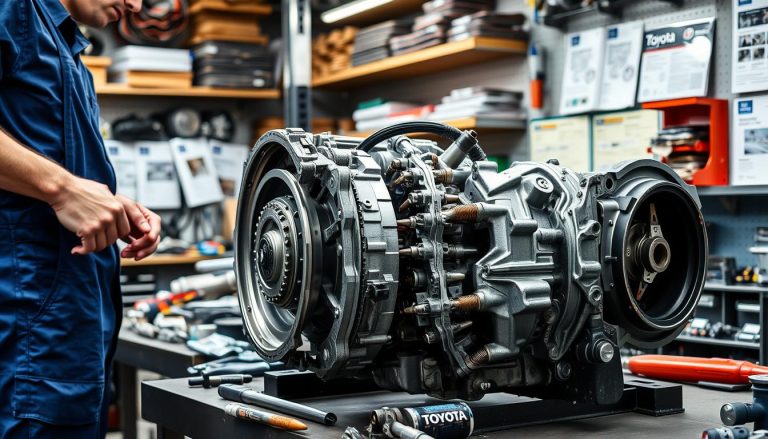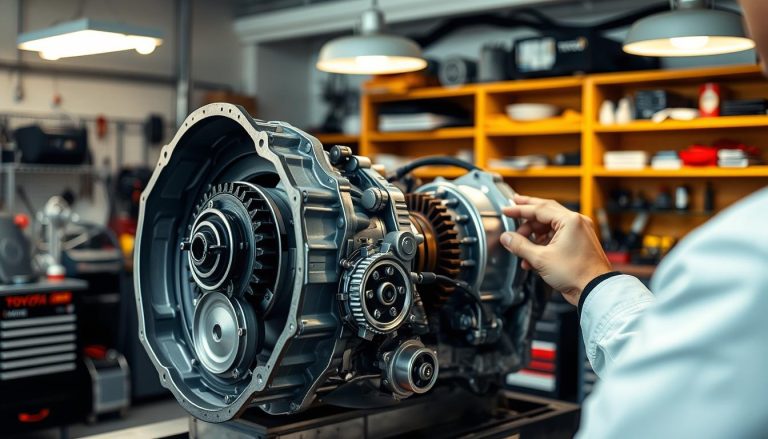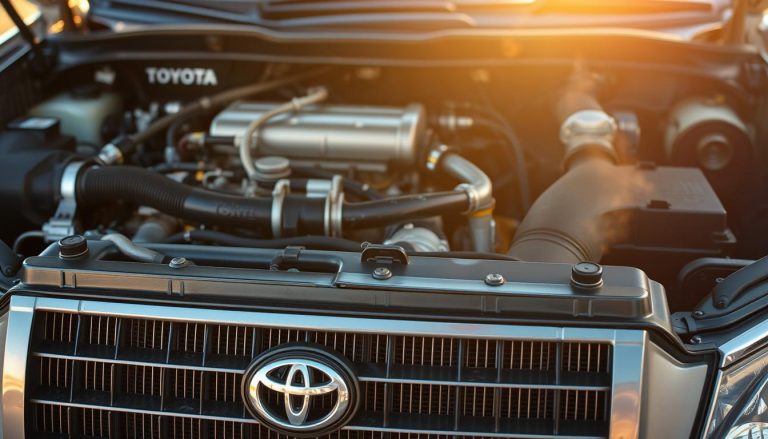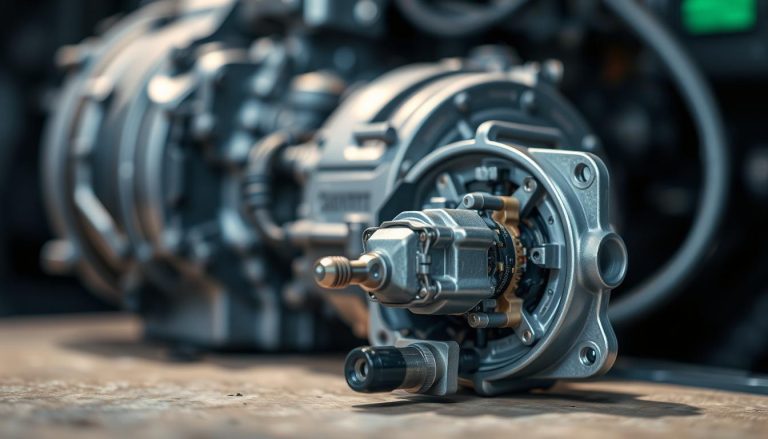Toyota Injector Problems: Symptoms, Diagnosis, and Fixes
Your car’s fuel system needs precision components to work well. Fuel injectors spray gasoline into the engine, making the right mix of air and fuel.
If these parts go wrong, your car will act differently. You might see rough idling, engine misfires, or use more fuel. The check engine light could also turn on, showing there’s a problem.
This guide is for Toyota owners to tackle injector issues. It works for Camry, Corolla, or RAV4 drivers. These steps will fix your engine and avoid expensive fixes later.
Key Takeaways
- Fuel injectors deliver precise amounts of gasoline for optimal combustion and engine performance
- Common symptoms include rough idling, misfires, poor fuel economy, and check engine lights
- Contamination, electrical issues, and normal wear cause most injector malfunctions
- Early diagnosis prevents expensive engine damage and maintains vehicle reliability
- Professional diagnostic tools help identify specific injector problems accurately
- Regular maintenance extends injector lifespan and improves overall fuel system health
Understanding Toyota Fuel Injectors and Their Function
The Toyota fuel injection system is a complex network of parts. It works together to give your engine the best performance. This includes the fuel filter, pump, and injectors, all working in perfect sync.
Learning how fuel injectors work means understanding their role. They are like electronic valves that spray fuel into a fine mist. The fuel pump sends gasoline to the injectors, which then spray it into the intake manifold or combustion chamber.
Your Toyota’s fuel delivery system needs the injectors and the engine control unit (ECU) to work together. The ECU figures out when and how long to spray fuel. It uses sensors like throttle position and engine temperature to do this.
Toyota cars use two main types of fuel injection. Port fuel injection (PFI) sprays fuel into the intake manifold. Direct injection (DI) injects fuel directly into the combustion chamber.
| Injection Type | Fuel Delivery Location | Primary Benefits | Common Toyota Models |
|---|---|---|---|
| Port Fuel Injection (PFI) | Intake Manifold | Better fuel mixing, lower cost | Camry, Corolla, RAV4 |
| Direct Injection (DI) | Combustion Chamber | Higher efficiency, more power | Highlander, Prius, Lexus models |
| Dual Injection | Both locations | Optimal performance, clean emissions | Newer Camry, Avalon |
The right mix of fuel and air is key for your Toyota’s performance. Proper injector function helps your car run smoothly and cuts down on harmful emissions.
Common Toyota Models Prone to Injector Failures
Toyota has many models that often face fuel injector issues. These problems can happen in different years and engine types. Knowing which models are at risk helps owners avoid future problems.
The Toyota Camry injector problems are common in 2007-2012 models with 2.4L engines. These cars often get clogged injectors from carbon buildup. They also need better fuel quality. Signs include rough idling and poor performance.
Toyota Corolla fuel issues are seen in 2009-2013 models with 1.8L engines. These cars have injector problems that lead to bad fuel economy and engine hesitation. Symptoms start slowly but get worse without regular care.
Toyota RAV4 injector failure is common in 2006-2012 models with 2.4L engines. The SUV’s varied driving conditions stress the injectors. City driving and highway cruising make it tough on the injectors.
The Toyota Prius hybrid models face unique challenges. Their fuel injectors sit idle for long when using electric power. This leads to buildup and clogging over time.
Larger Toyotas like the Highlander and Sienna with V6 engines sometimes have injector issues. Uneven heat and varying loads cause these problems. Trucks like Tacoma and Tundra also face injector stress from heavy use.
Older Toyotas with over 100,000 miles are more prone to injector problems. Wear, contamination, and aging seals increase the risk. Regular maintenance is key for these high-mileage vehicles.
Identifying Toyota Injector Problems: Key Warning Signs
Spotting Toyota injector symptoms early can save you from expensive engine damage. Early detection saves money and prevents big engine repairs. Most signs show up during daily driving, making it easy for Toyota owners to catch issues early.
Engine Performance Issues
Engine problems often mean your fuel injectors are failing. Your Toyota might hesitate when you accelerate or feel slow on highways. Power loss is more noticeable when going up hills or carrying heavy loads.
Misfiring makes your car sputter, felt through the steering wheel and seat. The engine might shake at idle, showing fuel delivery issues.
Fuel Economy Changes
Lower gas mileage is a clear sign of injector trouble. Your Toyota might need more gas, even if you drive the same. Poor fuel economy happens when injectors don’t deliver the right amount of fuel.
Too much fuel wastes gas, while too little makes the engine work harder. Both lead to less efficiency and mean your fuel injectors need fixing.
Physical and Sound Clues
Look for fuel stains or wet spots near the injectors in the engine bay. The smell of gasoline after driving often means a fuel system leak that needs quick attention.
Listen for odd engine sounds like knocking or pinging. Your Toyota might idle roughly. These sounds and physical signs help confirm injector issues before they damage your engine.
Advanced Symptoms of Deteriorating Toyota Injectors
Deteriorating Toyota injectors cause big problems while driving. These signs mean your car’s fuel system needs help fast to avoid engine failure.
As injector issues get worse, they mess with your car’s normal function. These symptoms get worse and harder to ignore, making it hard to drive safely.
Rough Idling and Engine Vibration
A rough idle Toyota shows when injectors start to fail. Your engine’s RPMs jump up and down, even when stopped.
Your car shakes and vibrates a lot when idling. This is because fuel isn’t being delivered evenly, causing some cylinders to get too little or too much fuel.
Your Toyota might struggle to find a steady idle speed. RPMs can jump from 500 to 1200 without warning. This makes driving uncomfortable for everyone in the car.
Acceleration and Power Loss Issues
Acceleration problems are serious, like when you need to merge onto the highway. Your Toyota feels slow and hard to start moving.
When you try to speed up, the engine hesitates. You have to push the gas pedal harder to get going. This makes driving uphill or passing hard.
Stalling and Misfiring Patterns
Toyota engine misfires happen more often and in the same spots. This is because damaged injectors aren’t delivering enough fuel to some cylinders.
Stalling can happen easily, even when you’re moving slowly. Your Toyota might turn off suddenly at lights or in parking lots.
| Symptom Category | Severity Level | Safety Impact | Repair Urgency |
|---|---|---|---|
| Rough Idling | Moderate to High | Low to Moderate | Within 2 weeks |
| Acceleration problems | High | High | Immediate |
| Engine Stalling | Very High | Very High | Immediate |
| Consistent Misfiring | High | Moderate to High | Within 1 week |
Step 1: Performing Visual Inspection of Toyota Fuel Injectors
Checking Toyota fuel injectors visually is key without spending a lot on tools. This visual inspection procedure helps avoid expensive mistakes. You can spot many issues just by looking with a flashlight and your eyes.
Do your inspection when it’s light out or in a bright garage. Clean the area around the fuel rail to see problems clearly.
Locating Injectors in Your Toyota Engine
Finding the right Toyota fuel injector location varies by model and engine. Most have injectors along the intake manifold, attached to a metal rail.
Take off the engine cover by lifting clips or unscrewing bolts. In cars like Camry and Corolla, injectors are in a row. But in Highlander and Sienna, they’re on both sides of the V6 engine.
Look for the cylindrical parts with electrical and fuel connections. These are linked to the fuel rail system.
Checking for Fuel Leaks and Damage
Spotting injector leaks needs a careful look at each injector and its area. Shine a light on dark spots where fuel might leak.
Watch for these signs:
- Wet spots or fuel stains around injector bodies
- Strong gasoline odors near the fuel rail
- Cracked or deteriorated rubber O-rings
- Fuel residue buildup on engine components
Focus on the injector mounts where seals often break. Take photos of any issues for later use.
Examining Electrical Connections
Check each electrical connector for damage or corrosion. Gently move them to make sure they’re tight on the injector terminals.
Look for melted plastic, green corrosion, or damaged wire insulation. Make sure the connector pins are clean and not damaged. Bad connections can cause problems and set off trouble codes.
Step 2: Using OBD-II Scanner for Toyota Injector Diagnosis
An OBD-II scanner makes fixing fuel injector issues easy for Toyota owners. It connects to your car’s computer to get error codes and live data.
Modern Toyotas save diagnostic trouble codes when the engine control module spots fuel system issues. These codes tell you which parts are not working right and why.
To start, find the OBD-II port under your dashboard on the driver’s side. Plug in the scanner and turn on the ignition but don’t start the engine. Then, follow the prompts to talk to the engine control module.
Common Toyota Injector Trouble Codes
Toyota cars have specific fuel injector codes for problems. Knowing these codes helps pinpoint the exact injector issue.
| Code | Description | Likely Cause | Affected System |
|---|---|---|---|
| P0200 | Injector Circuit Malfunction | General injector wiring issue | All cylinders |
| P0201-P0208 | Cylinder Specific Injector Circuit | Individual injector failure | Specific cylinder |
| P0300-P0308 | Cylinder Misfire Detected | Poor fuel delivery | Engine performance |
| P0171/P0174 | System Too Lean | Clogged injectors | Fuel mixture |
Reading and Interpreting Diagnostic Results
Understanding both active and pending codes is key. Active codes show current issues, while pending codes hint at future problems.
Look at the freeze frame data when Toyota OBD codes were set. It shows engine conditions during the malfunction, helping spot patterns or specific causes.
Live data streams let you watch injector pulse width and fuel trim values in real-time. These show how hard the engine control module works to keep fuel delivery right despite injector issues.
Step 3: Conducting Fuel Pressure Testing
Checking fuel system pressure is key to figuring out if your Toyota’s injectors are working right. This step gives you critical data. It shows if the fuel pump or pressure regulator is the issue, not just the injectors.
A Toyota fuel pressure test makes diagnosing easier. Low pressure might mean clogged injectors. But, if pressure is normal but the engine isn’t, it could be another injector problem.
Required Testing Equipment
You’ll need a fuel pressure gauge kit with Toyota-specific adapters. Most kits have many adapters, but make sure they fit your model’s fuel rail test port.
Don’t forget safety gear. Wear safety glasses, nitrile gloves, and have a fire extinguisher ready. You’ll be working with pressurized gasoline.
Other tools include shop rags for spills, a fuel line disconnect tool for older Toyotas, and basic tools for the fuel rail. Some Toyotas need you to remove engine covers or air intake parts.
Pressure Testing Procedure
First, relieve existing fuel system pressure for safety. Remove the fuel pump fuse and start the engine. Let it stall, then crank briefly to ensure all pressure is gone.
Next, connect your pressure gauge to the fuel rail test port. This port is usually in the middle of the rail, with a Schrader valve like tire valves.
Put the fuel pump fuse back in. Start the engine and watch the pressure readings at idle, when you press the throttle, and after you turn it off.
Analyzing Pressure Readings
Compare your readings with Toyota’s specs for your engine. Most naturally aspirated engines need 44-50 PSI at idle. Turbocharged engines might need more.
Low pressure could mean a clogged fuel filter, weak fuel pump, or blocked injectors. High pressure might point to a faulty pressure regulator or blocked return lines.
Watch how pressure changes after you turn off the engine. Gradual pressure loss is normal. But, if it drops fast, it could mean leaking injectors or failed check valves. You need to fix these right away.
“Fuel pressure testing is the foundation of proper injector diagnosis – it separates fuel delivery problems from actual injector failures.”
Step 4: Performing Injector Flow and Balance Tests
Professional flow rate measurement shows how each injector performs differently. This method gives a detailed look at your Toyota’s fuel system. It’s more detailed than basic scans, as it checks the actual fuel each injector sends out.
To test, you remove the fuel rail but keep the injectors on. This lets you measure fuel flow under controlled conditions. Specialized equipment mimics engine conditions without needing to run the car.
Setting Up Flow Rate Testing
Start by taking off the fuel rail from your Toyota’s engine. Make sure the injectors are securely attached. Place containers under each injector to catch the fuel during the test.
Next, connect the rail to a pressurized fuel source that matches your car’s needs. Most Toyotas need 40-60 PSI for accurate tests. Electronic pulse generators take over for the ECU during this step.
Make sure the area is well-ventilated and safe from fire before you begin. Fuel can be dangerous, so handle it carefully. Testing places use special ventilation systems for safety.
Measuring Individual Injector Performance
Run test cycles and measure the fuel each injector sends out. Good Toyota injectors should be close to each other, within 5%. Take readings at different pulse widths to see how they perform at different engine speeds.
Fuel injector balance tests show if any injectors are off. Compare your results to Toyota’s standards to find any issues. If an injector is way off, it might need cleaning, rebuilding, or replacing.
Keep a record of all your measurements. This helps you see how injectors change over time. It also helps you decide when to do maintenance.
Cleaning Toyota Fuel Injectors: DIY Methods
DIY injector maintenance is a great way for Toyota owners to fix fuel delivery issues. These methods can make your engine run better and save fuel. Toyota injector cleaning is needed when fuel and carbon build up, messing with spray patterns and fuel flow.
There are three main DIY ways to clean fuel injectors. Each method is different in how hard it is, how much it costs, and how well it works. This depends on how dirty your Toyota’s fuel system is.
Using Fuel System Cleaning Additives
The easiest way to clean fuel injectors is by adding special cleaners to your fuel tank. Brands like Chevron Techron, Lucas Fuel Treatment, and Sea Foam help break down carbon deposits as they move through your system.
Put the cleaner in a nearly empty tank before filling it up. This makes sure the cleaner spreads evenly through your fuel system. Drive your Toyota in different conditions like high speeds and city driving to get the best cleaning.
Most cleaners need one full tank of fuel to work right. You’ll see results after driving 50-100 miles normally.
Professional Cleaning Kit Application
Professional cleaning kits are more powerful than simple additives. They connect directly to your Toyota’s fuel rail, skipping the tank.
These kits use pressurized solvents to clean injectors while the engine runs. Follow all safety precautions and the manufacturer’s instructions carefully. The right pressure settings are key to avoid damaging your fuel system.
This method is good for injectors that are moderately clogged but don’t clean up with additives alone.
Ultrasonic Cleaning Techniques
Ultrasonic cleaning is the most thorough DIY option. It involves removing injectors from your Toyota’s engine and using special cleaning tools.
High-frequency sound waves break down tough deposits that other methods can’t handle. Professional ultrasonic cleaning can make severely clogged injectors work almost like new.
While it’s more complicated than other methods, ultrasonic cleaning is cost-effective for Toyotas with many clogged injectors.
| Cleaning Method | Difficulty Level | Cost Range | Effectiveness |
|---|---|---|---|
| Fuel Additives | Easy | $10-25 | Light deposits |
| Professional Kit | Moderate | $50-150 | Moderate deposits |
| Ultrasonic Cleaning | Advanced | $100-300 | Heavy deposits |
Complete Toyota Fuel Injector Replacement Guide
Replacing fuel injectors in Toyota vehicles needs the right tools, quality parts, and a step-by-step approach. This guide is for those with some mechanical skills. It helps you get your Toyota’s engine running smoothly and efficiently again.
Tools and Replacement Parts Required
To start the Toyota injector replacement, you need the right tools and parts. You’ll need new injectors that fit your Toyota model. Denso, Bosch, and Standard Motor Products make reliable options.
You’ll also need a socket wrench set, tools to disconnect fuel lines, and screwdrivers. A torque wrench is key for the right installation. Don’t forget safety gear like gloves and eye protection.
Always get new O-rings and seals, even if they look fine. They prevent leaks and keep the system pressurized. Using quality parts means your repair will last longer.
| Component Type | Recommended Brands | Typical Cost Range | Replacement Frequency |
|---|---|---|---|
| Fuel Injectors | Denso, Bosch, OEM Toyota | $80-150 each | Every 100,000 miles |
| O-Rings and Seals | OEM Toyota, Fel-Pro | $15-25 set | Every replacement |
| Fuel Rail Gaskets | OEM Toyota, Victor Reinz | $20-35 set | As needed |
| Cleaning Supplies | Brake cleaner, shop rags | $10-20 | Each service |
Step-by-Step Removal Process
First, disconnect the battery negative terminal and release fuel system pressure. Remove the fuel pump relay and run the engine until it stalls. This step removes any remaining pressure.
Next, remove the engine cover and air intake parts to get to the fuel rail. Disconnect all electrical connectors from the injectors, marking their spots for later. Photos help with reconnection.
Then, unbolt the fuel rail mounting bolts and lift the rail assembly. Be careful not to damage fuel lines or injector tips. Injectors usually twist or pull out of the fuel rail and cylinder head.
Installing New Injectors Properly
When installing new injectors, pay close attention to O-ring placement and orientation. Lubricate new O-rings with clean engine oil. Make sure injectors are fully seated in both the fuel rail and cylinder head.
Install components in reverse order of removal, ensuring all connections are secure. Replace any damaged fuel lines or fittings. Quality installation prevents future problems and ensures reliable operation.
Torque Specifications and Safety
Tighten fuel rail bolts to Toyota’s specified torque values, usually 15-20 ft-lbs, using a torque wrench. Over-tightening can crack the rail, while under-tightening allows leaks. Always follow the manufacturer’s specifications for your Toyota model.
After the Toyota injector replacement, cycle the ignition several times to pressurize the system before starting. Check for leaks around all connections and verify proper engine operation through careful test driving. Monitor fuel pressure and engine performance during the first few drives to ensure successful installation.
Rebuilding Toyota Injectors: When and How
Rebuilding injectors makes old parts work like new again, saving money. It’s great for expensive parts or when many injectors fail. Knowing when to rebuild or replace helps owners save money.
The rebuild vs replace choice depends on several things. Age, damage, and cost are key. Modern methods can make injectors work almost as well as new ones.
Determining if Rebuilding is Worthwhile
Rebuilding is smart for certain Toyota owners. High-mileage vehicles with many injector problems benefit from a full overhaul. Original parts usually rebuild better than aftermarket ones.
Rebuild when new injectors are over $150 each. Older Toyotas like Camry and Corolla have pricey OEM injectors. Avoid rebuilding if injectors are cracked, damaged, or very worn.
Think about total costs before you decide. Include the cost of rebuild kits, labor, and any warranty. Sometimes, replacing one injector is cheaper.
Professional vs DIY Rebuilding Options
Professional services give better results with special tools. They use ultrasonic cleaners and flow benches. Most offer warranties on their work.
DIY rebuilding needs basic skills and a rebuild kit. Home rebuilding is cheaper but lacks professional testing. Think about your skills and tools before trying DIY.
Pros charge $50-80 per injector, while DIY kits are $15-25. Go for professional rebuilding for critical needs or when precision is key.
Cost Breakdown for Toyota Injector Repairs
Repairing Toyota injectors can cost a lot, depending on how you fix them and what parts you use. Knowing these costs helps you plan your budget and pick the best fix for your car.
The cost of Toyota injector repair changes if you get it done by a pro or do it yourself. Professional services cost between $600 and $1,500. DIY fixes are cheaper, ranging from $200 to $600.
Parts and Materials Expenses
OEM Toyota injectors are the most expensive, costing $150 to $300 each. But, you can save money with quality aftermarket parts, priced at $75 to $150 each.
Prices for injector sets vary by engine size. For four-cylinder engines, aftermarket sets cost $300 to $600, while OEM sets are $600 to $1,200. You’ll also need O-rings and seals ($20-40), fuel rail gaskets ($15-25), and cleaning supplies ($50-100).
Labor Costs and Time Investment
Dealerships charge $120 to $180 per hour for labor. Replacing injectors takes 2 to 4 hours. Independent shops are cheaper, charging $80 to $120 per hour, which can save you money.
Diagnostic fees add $100 to $150 to your total bill. The fuel injector replacement price includes parts and labor. Professional services can cost $300 to $800 just for labor.
| Repair Type | Parts Cost | Labor Cost | Total Range |
|---|---|---|---|
| DIY Cleaning | $15-30 | $0 | $15-30 |
| Professional Cleaning | $50-100 | $100-200 | $150-300 |
| DIY Replacement | $200-600 | $0 | $200-600 |
| Professional Replacement | $400-800 | $300-800 | $700-1600 |
Preventing Future Toyota Injector Problems
Regular Toyota injector maintenance stops expensive repairs and keeps your engine running well. By taking care of your injectors, you save money and ensure they work efficiently. Knowing how to maintain them helps avoid costly breakdowns and keeps your car reliable.
Quality Fuel and Smart Additive Usage
Using the right fuel is key to keeping injectors in good shape. Choose TOP TIER certified gas stations for their high-quality detergent packages. These detergents help keep injectors clean.
Stay away from cheap gas stations with poor fuel quality. Low-grade gasoline often lacks cleaning agents needed to prevent carbon buildup. Adding fuel system cleaners every 3,000 to 5,000 miles can offer extra protection.
Most Toyota engines don’t need premium gasoline. But, it’s good for high-mileage vehicles with early injector issues. Use fuel stabilizers when storing your car for a long time to prevent fuel breakdown.
Essential Maintenance Schedule Guidelines
Always follow Toyota’s fuel filter replacement schedule. Most models need new filters every 30,000 to 60,000 miles, depending on how you drive. Clean air filters prevent contamination from entering the fuel system.
Keep up with your engine oil changes to avoid carbon buildup. Also, get professional fuel system cleaning every 30,000 to 50,000 miles. This keeps your fuel system clean and prevents performance issues.
Smart Driving Habits for Longevity
Keep your fuel tank level above one-quarter full to avoid sediment circulation. Low fuel levels allow contaminants to enter the fuel system more easily. Also, avoid storing your car for long periods with old fuel in the tank.
Occasionally drive at highway speeds to fully exercise the fuel system. Short trips that don’t reach operating temperature can lead to carbon buildup. These simple habits can greatly extend your injector’s life.
| Maintenance Task | Frequency | Benefit | Cost Impact |
|---|---|---|---|
| Fuel Filter Replacement | 30,000-60,000 miles | Prevents contamination | Low cost prevention |
| Fuel System Cleaning | 30,000-50,000 miles | Removes deposits | Moderate investment |
| Quality Fuel Usage | Every fill-up | Prevents buildup | Minimal extra cost |
| Fuel Additive Treatment | 3,000-5,000 miles | Enhanced cleaning | Very low cost |
When Professional Help is Necessary
Knowing when to seek professional help can save you time and money. It also prevents expensive engine damage. While many Toyota injector problems can be fixed at home, some need the skills and tools of professional Toyota service centers.
It’s important to know when to call for professional help. This ensures your vehicle gets the right care. Experts are needed for complex issues and when safety and warranty are at stake.
Complex Diagnostic Situations
Complex diagnostics need more than basic tools. They require specialized equipment like oscilloscopes and pressure transducers. These tools help find problems that don’t show up all the time.
Professionals can handle many system failures at once. They use advanced tools to find the source of the problem. When you can’t find the issue yourself, they have the right tools to help.
They deal with computer issues, fuel system problems, and emissions concerns. These need special training and tools.
Safety and Warranty Considerations
Safety considerations are a big reason to choose professional service. Working with high-pressure fuel systems can be dangerous. Trained technicians know how to avoid these risks.
Warranty coverage for new or certified pre-owned Toyotas requires professional Toyota service. They use OEM parts and follow safety rules. This ensures your vehicle is safe and reliable in the long run.
They also make sure your vehicle meets emissions and safety standards. This protects you and keeps your vehicle running well.
Toyota Warranty and Injector Problem Coverage
Understanding Toyota’s warranty for injectors can save a lot of money. Toyota warranty coverage includes fuel system parts under certain rules. These rules change based on the warranty type.
The factory warranty covers fuel injectors for 36 months or 36,000 miles. This is under the basic vehicle warranty. The powertrain warranty adds more time and miles for engine parts. Certified Pre-Owned vehicles get extra protection with extended warranties.
There are limits to injector warranty claims. If there’s a defect in materials or workmanship, repairs are covered. But, damage from bad fuel, poor care, or unauthorized additives won’t be covered.
| Warranty Type | Duration | Mileage Limit | Injector Coverage |
|---|---|---|---|
| Basic Vehicle | 36 months | 36,000 miles | Full coverage |
| Powertrain | 60 months | 60,000 miles | Engine-related only |
| Extended | Varies | Varies | Plan dependent |
Call an authorized Toyota dealer right away if you have injector issues under warranty. Use only OEM Toyota parts. Keep all service records to keep your warranty valid. Any unauthorized repairs can make future claims invalid.
Conclusion
Knowing your Toyota’s fuel system needs is key to good maintenance. This guide helps you fix injector problems with confidence. Catching issues early saves money and keeps your engine running smoothly.
Using quality fuel and changing filters regularly is essential. These steps keep your injectors clean and working right. Adding fuel system cleaners every few thousand miles helps prevent clogs.
If you face injector problems, you have several solutions. For minor issues, cleaning might do the trick. But for bigger problems, you might need a pro to replace or rebuild them. It’s important to act fast when you notice symptoms.
By taking good care of your Toyota’s fuel injectors, they’ll last longer. Stick to your owner’s manual for maintenance. Choose quality fuel and replace filters on schedule. These steps help avoid most injector issues.
But, for complex repairs, it’s best to get help from a pro. Always prioritize safety when working with fuel systems. With the right care and quick action on problems, your Toyota will serve you well for years.
FAQ
What are the most common signs that my Toyota has fuel injector problems?
Signs include rough idling and engine misfires. You might also see a drop in fuel economy. Hesitation when accelerating and an illuminated check engine light are common too.
Other signs are a shaking or vibrating car while stopped. You might hear knocking or pinging sounds from the engine. Sometimes, you’ll smell gasoline near the engine bay.
These symptoms start slowly and get worse if not fixed.
Which Toyota models are most prone to fuel injector issues?
Toyota Camry models from 2007-2012 with 2.4L engines often have clogged injectors. Toyota Corolla models from 2009-2013 with 1.8L engines tend to have rough idling.
The Toyota RAV4 (2006-2012) with 2.4L engines often face performance issues. Toyota Prius hybrid models can also have injector problems, mainly due to inactivity. Older Toyotas with over 100,000 miles are more likely to have issues.
Can I use fuel injector cleaner to fix my Toyota’s injector problems?
Fuel injector cleaners can help with minor clogging. Use premium cleaners like Chevron Techron or Lucas Fuel Treatment. Add it to a nearly empty tank before refueling.
Drive through different conditions to clean the injectors. But, if injectors are severely clogged or damaged, you’ll need professional help.
How much does it cost to replace Toyota fuel injectors?
OEM Toyota injectors cost 0-0 each. Aftermarket options are -0. A complete set for four-cylinder engines costs 0-0 for aftermarket or 0-
FAQ
What are the most common signs that my Toyota has fuel injector problems?
Signs include rough idling and engine misfires. You might also see a drop in fuel economy. Hesitation when accelerating and an illuminated check engine light are common too.
Other signs are a shaking or vibrating car while stopped. You might hear knocking or pinging sounds from the engine. Sometimes, you’ll smell gasoline near the engine bay.
These symptoms start slowly and get worse if not fixed.
Which Toyota models are most prone to fuel injector issues?
Toyota Camry models from 2007-2012 with 2.4L engines often have clogged injectors. Toyota Corolla models from 2009-2013 with 1.8L engines tend to have rough idling.
The Toyota RAV4 (2006-2012) with 2.4L engines often face performance issues. Toyota Prius hybrid models can also have injector problems, mainly due to inactivity. Older Toyotas with over 100,000 miles are more likely to have issues.
Can I use fuel injector cleaner to fix my Toyota’s injector problems?
Fuel injector cleaners can help with minor clogging. Use premium cleaners like Chevron Techron or Lucas Fuel Treatment. Add it to a nearly empty tank before refueling.
Drive through different conditions to clean the injectors. But, if injectors are severely clogged or damaged, you’ll need professional help.
How much does it cost to replace Toyota fuel injectors?
OEM Toyota injectors cost $150-$300 each. Aftermarket options are $75-$150. A complete set for four-cylinder engines costs $300-$600 for aftermarket or $600-$1,200 for OEM.
Professional labor costs $80-$180 per hour for 2-4 hours. Total repair costs range from $600-$1,500. DIY repairs cost $200-$600, depending on the parts.
What OBD-II trouble codes indicate Toyota injector problems?
Codes P0201-P0208 show individual cylinder injector circuit malfunctions. P0200 indicates general injector circuit problems. Codes P0300-P0308 point to cylinder-specific misfires.
Codes P0171 and P0174 suggest lean conditions from clogged injectors. P0172 and P0175 indicate rich conditions from leaking injectors. Always check freeze frame data for context.
How often should I clean my Toyota’s fuel injectors?
Use quality fuel injector cleaner every 3,000-5,000 miles for preventive maintenance. Schedule professional cleaning every 30,000-50,000 miles or when symptoms appear.
Always use TOP TIER certified gasoline. Consider more frequent cleaning for high-mileage vehicles or those showing performance issues.
Can I replace Toyota fuel injectors myself, or do I need professional help?
DIY replacement is possible with the right tools and experience. You’ll need fuel line disconnect tools, socket wrenches, new O-rings, and safety equipment.
Professional service is recommended for complex situations, warranty concerns, or high-pressure systems. Always relieve fuel system pressure and follow safety protocols to avoid fire hazards.
What fuel pressure should my Toyota maintain for proper injector operation?
Most naturally aspirated Toyota engines need 44-50 PSI fuel pressure. Use a fuel pressure gauge to measure pressure at idle, during throttle application, and after shutdown.
Low pressure may indicate a clogged fuel filter or weak pump. High pressure suggests a faulty pressure regulator.
Are Toyota fuel injector problems covered under warranty?
Toyota’s basic warranty covers injectors for 36 months/36,000 miles. Powertrain warranty extends to 60 months/60,000 miles. Coverage includes defects in materials or workmanship.
It excludes damage from contaminated fuel or lack of maintenance. Certified Pre-Owned vehicles may have additional coverage. Always use authorized dealers and OEM parts to maintain warranty validity.
What’s the difference between port fuel injection and direct injection in Toyota engines?
Port fuel injection (PFI) sprays fuel into the intake manifold. It mixes with air before entering the combustion chamber. Direct injection (DI) injects fuel directly into the combustion chamber under higher pressure.
Both systems work with the engine control unit (ECU) to control fuel delivery. They do this based on various sensor inputs for optimal performance and emissions control.
How can I prevent future Toyota injector problems?
Use high-quality gasoline from TOP TIER certified stations. Replace fuel filters every 30,000-60,000 miles. Maintain regular air filter changes.
Avoid extended vehicle storage with old fuel. Keep fuel tank levels above one-quarter full. Occasionally drive at highway speeds. Use fuel stabilizers for long-term storage and run higher-quality fuel periodically.
What tools do I need to diagnose Toyota injector problems?
You’ll need an OBD-II scanner for reading trouble codes. A fuel pressure gauge kit with Toyota-specific fittings is also essential. Basic hand tools, flashlight, and safety equipment are necessary.
For advanced diagnosis, you may need fuel line disconnect tools, a multimeter for electrical testing, and access to live data streams. Professional diagnosis may require oscilloscopes and manufacturer-specific scan tools for detailed analysis.
,200 for OEM.
Professional labor costs -0 per hour for 2-4 hours. Total repair costs range from 0-
FAQ
What are the most common signs that my Toyota has fuel injector problems?
Signs include rough idling and engine misfires. You might also see a drop in fuel economy. Hesitation when accelerating and an illuminated check engine light are common too.
Other signs are a shaking or vibrating car while stopped. You might hear knocking or pinging sounds from the engine. Sometimes, you’ll smell gasoline near the engine bay.
These symptoms start slowly and get worse if not fixed.
Which Toyota models are most prone to fuel injector issues?
Toyota Camry models from 2007-2012 with 2.4L engines often have clogged injectors. Toyota Corolla models from 2009-2013 with 1.8L engines tend to have rough idling.
The Toyota RAV4 (2006-2012) with 2.4L engines often face performance issues. Toyota Prius hybrid models can also have injector problems, mainly due to inactivity. Older Toyotas with over 100,000 miles are more likely to have issues.
Can I use fuel injector cleaner to fix my Toyota’s injector problems?
Fuel injector cleaners can help with minor clogging. Use premium cleaners like Chevron Techron or Lucas Fuel Treatment. Add it to a nearly empty tank before refueling.
Drive through different conditions to clean the injectors. But, if injectors are severely clogged or damaged, you’ll need professional help.
How much does it cost to replace Toyota fuel injectors?
OEM Toyota injectors cost $150-$300 each. Aftermarket options are $75-$150. A complete set for four-cylinder engines costs $300-$600 for aftermarket or $600-$1,200 for OEM.
Professional labor costs $80-$180 per hour for 2-4 hours. Total repair costs range from $600-$1,500. DIY repairs cost $200-$600, depending on the parts.
What OBD-II trouble codes indicate Toyota injector problems?
Codes P0201-P0208 show individual cylinder injector circuit malfunctions. P0200 indicates general injector circuit problems. Codes P0300-P0308 point to cylinder-specific misfires.
Codes P0171 and P0174 suggest lean conditions from clogged injectors. P0172 and P0175 indicate rich conditions from leaking injectors. Always check freeze frame data for context.
How often should I clean my Toyota’s fuel injectors?
Use quality fuel injector cleaner every 3,000-5,000 miles for preventive maintenance. Schedule professional cleaning every 30,000-50,000 miles or when symptoms appear.
Always use TOP TIER certified gasoline. Consider more frequent cleaning for high-mileage vehicles or those showing performance issues.
Can I replace Toyota fuel injectors myself, or do I need professional help?
DIY replacement is possible with the right tools and experience. You’ll need fuel line disconnect tools, socket wrenches, new O-rings, and safety equipment.
Professional service is recommended for complex situations, warranty concerns, or high-pressure systems. Always relieve fuel system pressure and follow safety protocols to avoid fire hazards.
What fuel pressure should my Toyota maintain for proper injector operation?
Most naturally aspirated Toyota engines need 44-50 PSI fuel pressure. Use a fuel pressure gauge to measure pressure at idle, during throttle application, and after shutdown.
Low pressure may indicate a clogged fuel filter or weak pump. High pressure suggests a faulty pressure regulator.
Are Toyota fuel injector problems covered under warranty?
Toyota’s basic warranty covers injectors for 36 months/36,000 miles. Powertrain warranty extends to 60 months/60,000 miles. Coverage includes defects in materials or workmanship.
It excludes damage from contaminated fuel or lack of maintenance. Certified Pre-Owned vehicles may have additional coverage. Always use authorized dealers and OEM parts to maintain warranty validity.
What’s the difference between port fuel injection and direct injection in Toyota engines?
Port fuel injection (PFI) sprays fuel into the intake manifold. It mixes with air before entering the combustion chamber. Direct injection (DI) injects fuel directly into the combustion chamber under higher pressure.
Both systems work with the engine control unit (ECU) to control fuel delivery. They do this based on various sensor inputs for optimal performance and emissions control.
How can I prevent future Toyota injector problems?
Use high-quality gasoline from TOP TIER certified stations. Replace fuel filters every 30,000-60,000 miles. Maintain regular air filter changes.
Avoid extended vehicle storage with old fuel. Keep fuel tank levels above one-quarter full. Occasionally drive at highway speeds. Use fuel stabilizers for long-term storage and run higher-quality fuel periodically.
What tools do I need to diagnose Toyota injector problems?
You’ll need an OBD-II scanner for reading trouble codes. A fuel pressure gauge kit with Toyota-specific fittings is also essential. Basic hand tools, flashlight, and safety equipment are necessary.
For advanced diagnosis, you may need fuel line disconnect tools, a multimeter for electrical testing, and access to live data streams. Professional diagnosis may require oscilloscopes and manufacturer-specific scan tools for detailed analysis.
,500. DIY repairs cost 0-0, depending on the parts.
What OBD-II trouble codes indicate Toyota injector problems?
Codes P0201-P0208 show individual cylinder injector circuit malfunctions. P0200 indicates general injector circuit problems. Codes P0300-P0308 point to cylinder-specific misfires.
Codes P0171 and P0174 suggest lean conditions from clogged injectors. P0172 and P0175 indicate rich conditions from leaking injectors. Always check freeze frame data for context.
How often should I clean my Toyota’s fuel injectors?
Use quality fuel injector cleaner every 3,000-5,000 miles for preventive maintenance. Schedule professional cleaning every 30,000-50,000 miles or when symptoms appear.
Always use TOP TIER certified gasoline. Consider more frequent cleaning for high-mileage vehicles or those showing performance issues.
Can I replace Toyota fuel injectors myself, or do I need professional help?
DIY replacement is possible with the right tools and experience. You’ll need fuel line disconnect tools, socket wrenches, new O-rings, and safety equipment.
Professional service is recommended for complex situations, warranty concerns, or high-pressure systems. Always relieve fuel system pressure and follow safety protocols to avoid fire hazards.
What fuel pressure should my Toyota maintain for proper injector operation?
Most naturally aspirated Toyota engines need 44-50 PSI fuel pressure. Use a fuel pressure gauge to measure pressure at idle, during throttle application, and after shutdown.
Low pressure may indicate a clogged fuel filter or weak pump. High pressure suggests a faulty pressure regulator.
Are Toyota fuel injector problems covered under warranty?
Toyota’s basic warranty covers injectors for 36 months/36,000 miles. Powertrain warranty extends to 60 months/60,000 miles. Coverage includes defects in materials or workmanship.
It excludes damage from contaminated fuel or lack of maintenance. Certified Pre-Owned vehicles may have additional coverage. Always use authorized dealers and OEM parts to maintain warranty validity.
What’s the difference between port fuel injection and direct injection in Toyota engines?
Port fuel injection (PFI) sprays fuel into the intake manifold. It mixes with air before entering the combustion chamber. Direct injection (DI) injects fuel directly into the combustion chamber under higher pressure.
Both systems work with the engine control unit (ECU) to control fuel delivery. They do this based on various sensor inputs for optimal performance and emissions control.
How can I prevent future Toyota injector problems?
Use high-quality gasoline from TOP TIER certified stations. Replace fuel filters every 30,000-60,000 miles. Maintain regular air filter changes.
Avoid extended vehicle storage with old fuel. Keep fuel tank levels above one-quarter full. Occasionally drive at highway speeds. Use fuel stabilizers for long-term storage and run higher-quality fuel periodically.
What tools do I need to diagnose Toyota injector problems?
You’ll need an OBD-II scanner for reading trouble codes. A fuel pressure gauge kit with Toyota-specific fittings is also essential. Basic hand tools, flashlight, and safety equipment are necessary.
For advanced diagnosis, you may need fuel line disconnect tools, a multimeter for electrical testing, and access to live data streams. Professional diagnosis may require oscilloscopes and manufacturer-specific scan tools for detailed analysis.

